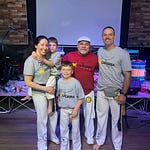🔥Welcome to Volume #00101!🔥
I’m Christian Champ. This is ☯️The Middle Way Newsletter ☯️. It is a place where I write, explore, share, and invite you along for the journey.
If you enjoy the newsletter, please share it with your friends.
📶Do We Make It Better?📶
I realized my mistake immediately.
Regret struck as soon as the words left my mouth.
My words floated in the air, creating a storm.
The storm brought thunder and lightning.
Arguing a point, I ruined a perfect evening.
A tornado ripped through the heart of the dinner.
The timing was off.
The tone was off.
The words were off.
Instead of realizing my error, my ego pushed me to double down and try again.
The timing was off.
The tone was off.
The words were off
My intention felt pure, but the attempt looked pathetic.
It’s clear when we make things better and when we make things worse.
We feel it in our gut when we mess up. We can feel the energy shift inside of us and in the room.
We know leaders who we want to follow. We know leaders who, when they poke their heads up, we all feel ashamed to call them our boss.
It’s clear when people make things better and when they make them worse.
The Goal is to Always Make it Better
We can ask ourselves, when do you make it better?
We can run down the list of things in our lives, asking that question.
Think of everything we care about and spend time on… Do we make it better?
When we show up, do we make it better?
We need to state how we make it better. Where we have answers, can we make it even better? Where we don’t have answers, we need to change our behaviors.
The best thing about this question is our answers provide us with guidance and insight. The only person stopping us from changing our approach is us!
There is no boss to blame: no system or bad luck to shake our heads at. It all sits on our choices and actions.
We know the bosses that suck the air out of the room and make it worse. We know the bosses that give everyone rocket boosters and propel us to new heights.
We want to show up and give out the rocket boosters. We want to show up like the leaders that propel us to new heights.
We all know the feeling of bringing something to the table. We see the goodness we create and facilitate when we add energy.
When we show up and make it better, our life and the lives of everyone around us improve.
What do we need to change to always make it better?
🧠Things to Think About🧠
Pamela Hobart on How to Set Achievable Goals
Pamela notes the power of SMART (specific, measurable, attainable, realistic, and time-specific) goals.
We start with aiming toward the thing and defining it. This works well for things we can quantify.
When we talk about “goals” in the context of productivity, they typically have a specific meaning: medium- to long-term targets of effortful action, often dependent on an extensive and/or complicated chain of preceding events.
In the absence of well-formulated goals, your behavior is likely to revert to its mean—behaving thoughtlessly in accordance with pre-existing habits (whether good or bad) and in response to local environmental pressures (from your boss, coworkers, and family, again whether for better or worse).
However, in another sense, everything we do on purpose can be thought of as furthering some goal: dropping a piece of paper into the wastebasket, emptying clean dishes from the dishwasher into your kitchen cabinets, driving your car from home to the office. We just don’t think of those as “goals” per se because there is much less uncertainty about how to do these tasks, and whether they can or will ever get done. Much of the time, we pursue these implied goals implicitly, without self-consciousness and friction. Even people who struggle with heftier career and personal goals, like getting a promotion or losing weight, succeed at them.
Not all goals fit into the quantitative box, like “making it better.” The qualitative goals work with a “SMARTish” framework, where we plan out the measurement and perhaps rely on others to help gauge your improvements.
Measuring and planning qualitative change is harder than choosing a specific next action. I wouldn’t suggest giving yourself a weekly 1 to 10-type score on these dimensions, hoping to plot the improvement in a spreadsheet. You may still have no idea of the timeline for when you will count as a “patient” or “generous” person. But that’s OK. The qualitative goal is now SMART-ish, more relevant, and specifically actionable than before. It doesn’t have to be as structured as planning a job search or fitness regimen.
In fact, even just having had a conversation along these lines with a friend or coach, or with yourself in your journal, can help you see your existing habits and circumstances with fresh eyes. Since you can’t reliably change something that you don’t even notice in the first place, the messy process of qualitative improvement must start here.
Erik Hoel writes about Remote Work Being the Best Work for Families
Working from home for a number of years now, the magic of seeing your kids every morning never wears off. The interactions are short, but it’s all about the power of being there.
I remember the first time I picked my son up from school. He was so excited as we walked home. He didn’t want me to talk; he only wanted me to walk next to him. WFH lets you create that type of daily presence.
Erik breaks down a key part of remote work, what it does for families. He notes that no political party backs WFH since it helps families when the parties normally fight over who better protects the family.
So I’ll say it: the primary benefit for remote work for a lot people, if not most of them eventually, is that it makes balancing career with family much easier. Like my sister, who works a high-powered job at Lego from an office in her house with her three kids a couple days a week, and commutes the other times. Does she work during the day when she’s home? Obviously. But if you have kids, you know that one of the biggest issues is just the lack of flexibility and adaptability. Sometimes you just need 15 minutes. Sometimes you need to make lunch. Sometimes you need to switch the laundry. Sometimes you just want to spend a couple minutes saying hi and playing. Sometimes you need to spend ten minutes settling a toddler down for a nap and then you’ll have the next three hours free, but this could happen at 11:15 or 11:30 and you don’t know which. Sometimes you want to be there when they get back from school, just to ensure they settle in doing something productive or interesting, and a full-time office job plus a commute makes such little conveniences and acts of organization impossible.
🎧Things to Listen, See, and Watch 🎧
Failure Clarity
Thi Nguyen on the idea of “Failure Clarity,” where we choose a process that might not be the BEST, but easily alerts us when we fail.
It’s an example of poka-yoke!
👇👇👇



OnBeing Podcast on The Trilling Science of Awe
Krista Tippet interviews David Keltner about Awe. It’s not the big awes, but the everyday awes. It’s interesting how aging and having children shifted my view of the awe moments.
Instead of the grandiose things, it’s skating at a skatepark and watching my kids ramp up and do things better than I can.
Another thing Keltner touches on is movement and keeping those traditions alive.
Keltner: But, you know. But yeah, and that was this big surprise in this research, is how ordinary awe can be. It’s everywhere, right? So it’s the flowers blooming and the moral beauty of people, and some pattern of light on the sidewalk. So yeah, we called them “Eight Wonders of Everyday Life.”
Keltner:Well it comes — “allowing goodness its own speech,” comes out of a graduation speech by Toni Morrison, the great writer, who said this is what she sees to be the purpose of her creative life and literature and the like. And Krista, I mean obviously we live in these times where you arrive at a really cynical view of human beings. And that cynical view, I might add, has prevailed in a lot of the social sciences, and it’s been refuted — that people actually share instinctively, we cooperate, we have neurophysiological systems that help us care for a lot of people. It’s, as Darwin said, sympathy is our strongest instinct.
Keltner:And what struck me about the ease with which people around the world would, like, “Hey, what’s awe inspiring?” They didn’t mention a God or the Grand Canyon. They mention ordinary people doing amazing things. And so I felt like that scientific act was “allowing goodness its own speech.” Like, man, this just surfaces in how people think about the transcendent.
And I hope — you know I just, I think we need more of that. We need more stories around goodness and this human capacity.
Keltner:And a sense of like, “Wow, look at what I’m part of. You know, I’m part of this human — this collective.” What a striking tendency we have.
And I, as I started to dig into this concept, I love Søren Kierkegaard’s quote. You know, this grouchy philosopher writing about dread. He’d go out and walk, and he would say: it puts me into contact with the significance of insignificant things. You know? And that’s how I felt, like man, watching kids line up to go play is awesome. Or marching to their preschool in their incredible ways.
Keltner:Yeah. You know, I mean, almost all cultures have deep histories and traditions of dance. I was just in the Himalayas, in Bhutan for this project, and the Layap people dance all the time. You know, they have a government ceremony and then they dance. And that is very human to move in unison like that. And it’s, as you said, Krista, it’s life-giving. And I hate juxtaposing with our screen-based, chair-based life, but we’ve lost that. And, but I see young people moving back to it of board games and dance clubs and, so I have hope we can return to it.
We did a study of really poor kids and veterans rafting, and we measured the hormone cortisol, which is a stress hormone. At the start of the day, their hormone levels were all different. They’re separate individuals. By the end of the day, after having rafted with a little collection of people, their hormone levels are the same. Lots of data on that. And, and that’s striking that these processes of collective effervescence — you’re doing rituals in a church, right? You’re chanting at a game. You are greeting people in a ceremony. They sync us up physiologically, which enables lots of good things.
Keltner:Yeah. And music and singing. And by the way, as a non-religious person, one of the things that science taught me is: go find that. You know? And you’ll piece it together in interesting ways. And I think that’s — it’s what we’re doing anyway. It’s so intelligent in our culture. And for those people like me who are a little bit more data-driven, this science points us in that direction.
Keltner:For me, the awe practice in the grief was, I — awe walks are simply — we’ve tested this scientifically — go out and do a walk and look for things that amaze you, big and small. And you can do that. I gathered up a lot of sacred texts to stay close to. I went to “awe spots.” I just — I don’t know much about music, but I really intentionally went into music to find what is awe-inspiring about it. So, I made it a practice in life like a lot of people do like you’ve said, like religion or spirituality. And it changed my life.
💣Words of Wisdom💣
"What matters is now: how we live, work and create together in this very moment, relying on and cultivating our best human qualities, creating meaning by how we are together in the present moment." (Margaret J. Wheatley, So Far From Home)
"I want to produce the same outcome, under ever-changing conditions, I have to use a different movement every time." (Rob Gray, How We Learn to Move a Revolution in the Way We Coach Practice Sports Skills)
"The best moments in our lives are not the passive, receptive, relaxing times. The best moments usually occur when a person’s body or mind is stretched to its limits in a voluntary effort to accomplish something difficult and worthwhile." (Chris Guillebeau)
"I think perhaps a better thing to want is fulfillment. A deeper state, one that comes from within, from being your best self. From living life the way you really wish to live it. Then, happiness emanates from within as a byproduct." (Kamal Ravikant, Live Your Truth)
"That’s why stories appeal to us. They give us the clarity and simplicity our real lives lack.” (Patrick Rothfuss, The Name of the Wind)
“Is," "is," "is"—the idiocy of the word haunts me. If it were abolished, human thought might begin to make sense. I don't know what anything "is"; I only know how it seems to me at this moment.” ― Robert Anton Wilson, Nature's God
"I advise everyone to find an island in this life. Find a place where this culture can’t take energy from you, sap your will and originality. Since anything physical can be mental, that island can be your home.” (The RZA, The Tao of Wu)
"In this example is the basic value proposition of Essentialism: only once you give yourself permission to stop trying to do it all, to stop saying yes to everyone, can you make your highest contribution towards the things that really matter." (Greg McKeown, Essentialism)
"Your movie, your album, your new startup … what is it about? When you know that, you’ll know the end state. And when you know the end state, you’ll know the steps to take to get there." (Steven Pressfield, Do the Work)
"Mann’s point is not only that we are often too busy to get organized, but that if we focused on practical action, we wouldn’t need to get organized." (Tim Harford, Messy)
"Boundaries give life structure, which makes us comfortable. But they can also be shifted, rethought, reframed, and reorganized." (Dave Gray, Liminal Thinking)
"There’s an old saying “We treasure what we measure.” Schools tend to focus more attention, and place more value, on the things that they can measure, rather than valuing and focusing on the things that will make the biggest difference in children’s lives." (Mitchel Resnick)
"Before entering into a conversation, or even greeting someone at work or on the street, find something you respect about the person you are about to engage. You don’t even have to tell him about it. Just notice how your respect changes the way you speak to him." (Sakyong Mipham)
🙏Thanks for Reading🙏
When do you need to pause before acting to make sure that you make it better?
Namaste,
Christian













